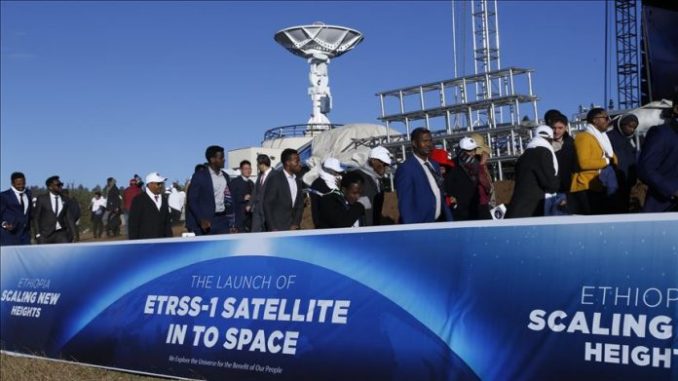
After two missed deadlines, Ethiopia launched its long-awaited first satellite into space on Friday December 20, 2019. Proud officials and awed citizens gathered at the Entolo Observatory and Research Centre to watch the live broadcast of the launch from a space station in China.
With this launch Ethiopia joins Nigeria, Rwanda, Morocco, Algeria, Kenya, Egypt, Ghana, Angola, South Africa and Sudan as the African countries with satellites in space and leveraging it to advance scientific innovation and other development goals.
According to Space in Africa, since 1998 till date, these 11 African countries have launched 41 satellites.
According to the African Space Industry Report – 2019 edition, the African space economy is now worth USD 7 billion and is projected to grow at a 7.3% compound annual growth rate to exceed USD 10 billion by 2024.
This burgeoning industry holds much promise and with Ethiopia’s successful satellite launch, there are several benefits to be derived from this, chief of which is job creation.
Ethiopia’s Unemployment Rate is projected to trend around 19.40% in 2020, this satellite launch will help provide employment across many fields and sectors, especially engineering, information and technology, communications and much more. There are multiplying businesses opportunities for local and foreign companies, institutions and organizations across the various sub-sectors deriving from the space industry, and this will mean more employment opportunities across the country.
Ethiopia’s economy is heavily dependent on its agriculture industry which accounts for half of the country’s gross domestic product (GDP), about 83.9% of the country’s exports and 80% of total employment in the country. However, the industry is impacted by periodic drought, soil degradation caused by overgrazing, deforestation and more that can all be addressed using space-based technology.
Farmers and other players in the agriculture space and its many extensions including food manufacturers and policy makers will benefit from capabilities of the satellite and space-based technology. For example, remote sensing via the satellite can help provide key data for monitoring soil, drought and crop development. Vital information and analysis can also be derived and used to determine agricultural output well in advance and can be essential in predicting and mitigating famines and food shortages.
Much more possibilities exist with this satellite launch for Ethiopia, especially when placed in the context of wider systems of innovation that go beyond sectorial and national boundaries.